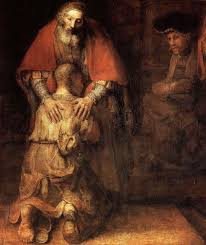Theresa of Avila wrote that “love is like a perfume-filled room.” Could it be that we can only describe such an ineffable concept using symbol and metaphor?
It is often said that God is love. Indeed, the seemingly most straightforward answer we have to the question of what is God is found in 1 John 4:8, “Whoever is without love does not know God, for God is love.” One must realize that love is not a name, rather it describes a relationship. Again, particularly in the Gospel of John, the love commandments are explicit in their emphasis on reciprocity within the fellowship of believers, “If I, therefore, the master and teacher, have washed your feet, you ought to wash one another’s feet. I have given you a model to follow, so that as I have done for you, you should also do” (Jn 13:14-15).
The Greek word agapé is often used to describe the type of love so often professed in the New Testament, especially in the love commandments of the Johannine writings. Agapé describes a type of love for another in which one seeks nothing back in return—a self gift. It is not an abstract concept, but rather appears to describe a way of life. It is, in particular, a way of living among people who form a particular tradition or community.
The Christian tradition, with its doctrine of the Holy Trinity, sees God as a relational being: the Lover, the Beloved, and the Love between them. From all eternity God gives love, receives love, and is love. For this reason, agapé is perhaps the least wrong reason for thinking about the mystery of God.
How does one get in touch with a relational God? The obvious answer is by entering into a relationship. One cannot do it alone. One can view this notion of love as communion between God, self, and others. As such, the primary and essential location of agapé is embedded within the community of believers, “For where two or three are gathered together in my name, there am I in the midst of them” (Mt 18:20). Thus, the church serves as a focal point to sustain Christian love. It is a community in which the generosity of one is encouraged and rewarded by the generosity of others. It serves to raise itself both upward toward God and inward toward fellowship of those that share in the vision of God.
Agapé is embodied in the church, and as such has an essential social function to be open to all. Christian love is participatory and mutual within the koinonia or fellowship of the faithful. It is, however, not exclusive. The goal of Christian love is always to bring the stranger into fellowship. This social nature of the agapé community is nurtured by a life of worship, both liturgy and scripture being necessary for its ongoing sustenance.
By God’s entering into history (Incarnation), the church takes on a historical dimension. The community has as one of its main purposes to pass on the memory of agapé and its traditions from generation to generation. The intimacy of mutual love between God, self, and neighbor is necessary if the history of the faith community is not to be cut short. The church thus sustains agapé in the history of salvation.

